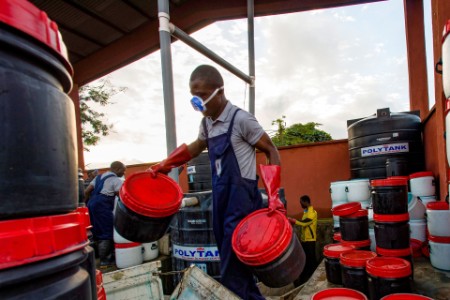The question should no longer be about why we should seek to accelerate progress. The why is clear. What matters now, more than ever, is how scale can be achieved.
Now, in collaboration with the TBC, we are applying a wider lens. Drawing on the experiences of past and present enterprises in the TBC’s Toilet Accelerator program — several of which have benefitted from EY support to enhance their resilience, productivity and capacity to scale sustainably — a forthcoming report aims to show how the potential of a transformational sanitation economy can be realized.
From bundling sanitation with other services to create a better, broader user experience, to creating demand for transformed toilet resources, to becoming asset light to make invested capital stretch further, Toilet Accelerator enterprises are illuminating multiple pathways to greater efficiency, profitability and scale.
They are proving that better answers to the global sanitation crisis already exist. They just need to be scaled. In sharing their stories, and practical insights that others can follow, we hope to accelerate progress toward the sanitation economy, by encouraging more entrepreneurs to take up the challenge and stimulating the investment that can help make it happen.
If not now, when?
We sit at a critical inflection point in the pursuit of access to adequate and equitable sanitation and hygiene for all by 2030. The business case has already been made — powerfully. And better answers to the global sanitation crisis already exist. But unless and until the debate meaningfully shifts from why a transformational sanitation economy is a good idea toward how to rapidly scale and replicate these answers, the prize is likely to remain elusive.
That prize deserves greater attention and commitment to act. It deserves greater attention and commitment from governments and municipal authorities who can rid themselves of the unaffordable public costs of sewered sanitation, while reaping huge cost-avoidance advantages in improving community health.
And it demands greater attention and commitment from entrepreneurs and impact investors who can unearth huge value, not only from serving the 4.5 billion people still lacking access to safely managed forms of sanitation today, but also helping to tackle related goals for sustainable development, such as safe water, food security, renewable energy, and good health and well-being.
Building a profitable, sustainable sanitation business serving low-income customers is hard, but it can be done. Innovative enterprises are already bringing dignity and a better quality of life to millions of people. With the right support, the EY organization, WSUP and the TBC believe that they, and others like them, can bring affordable, sustainable and safely managed sanitation to hundreds of millions more of the people who so desperately need it.
Summary
Meeting the United Nations Sustainable Development Goal of equitable sanitation for all by 2030 offers vast potential for global economic growth, while addressing one of the most urgent social challenges of our time. In India alone, the potential annual value of a transformational sanitation economy is estimated to be US$62 billion by 2021.


